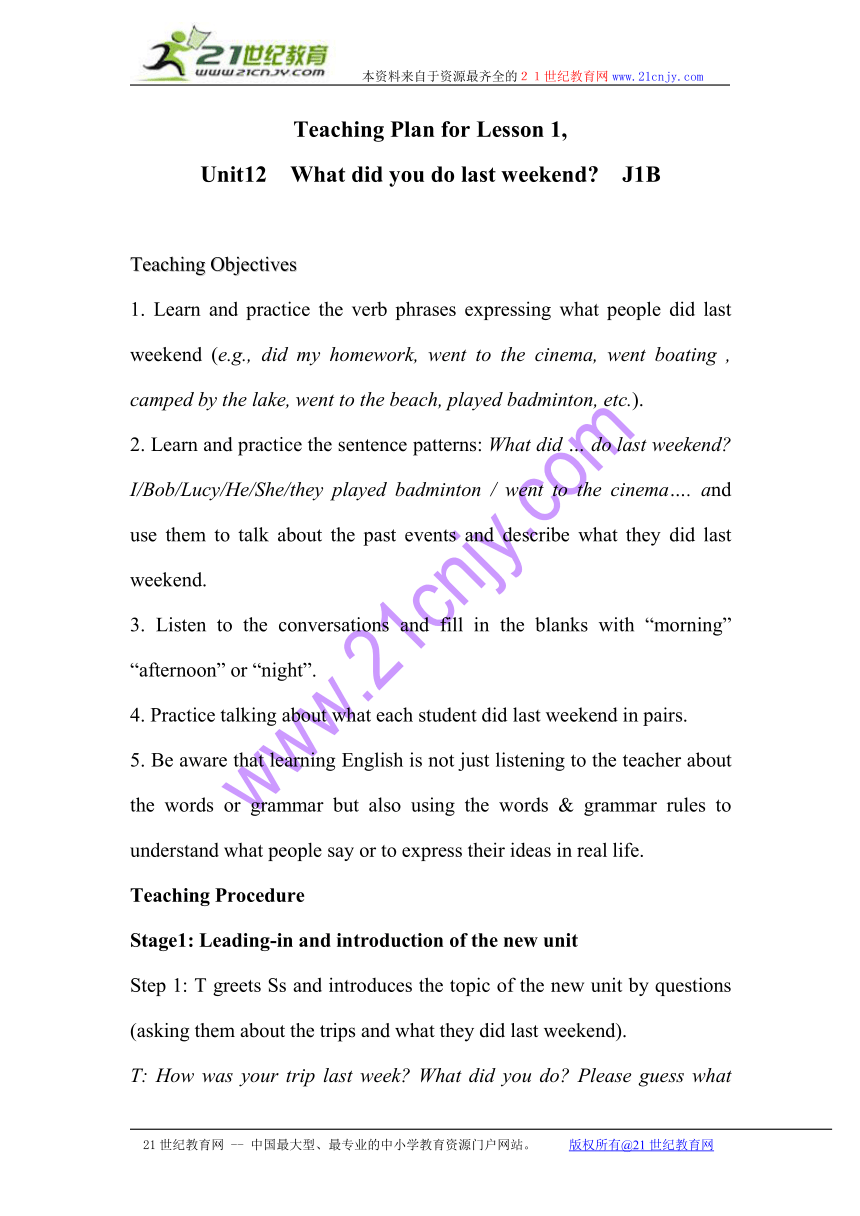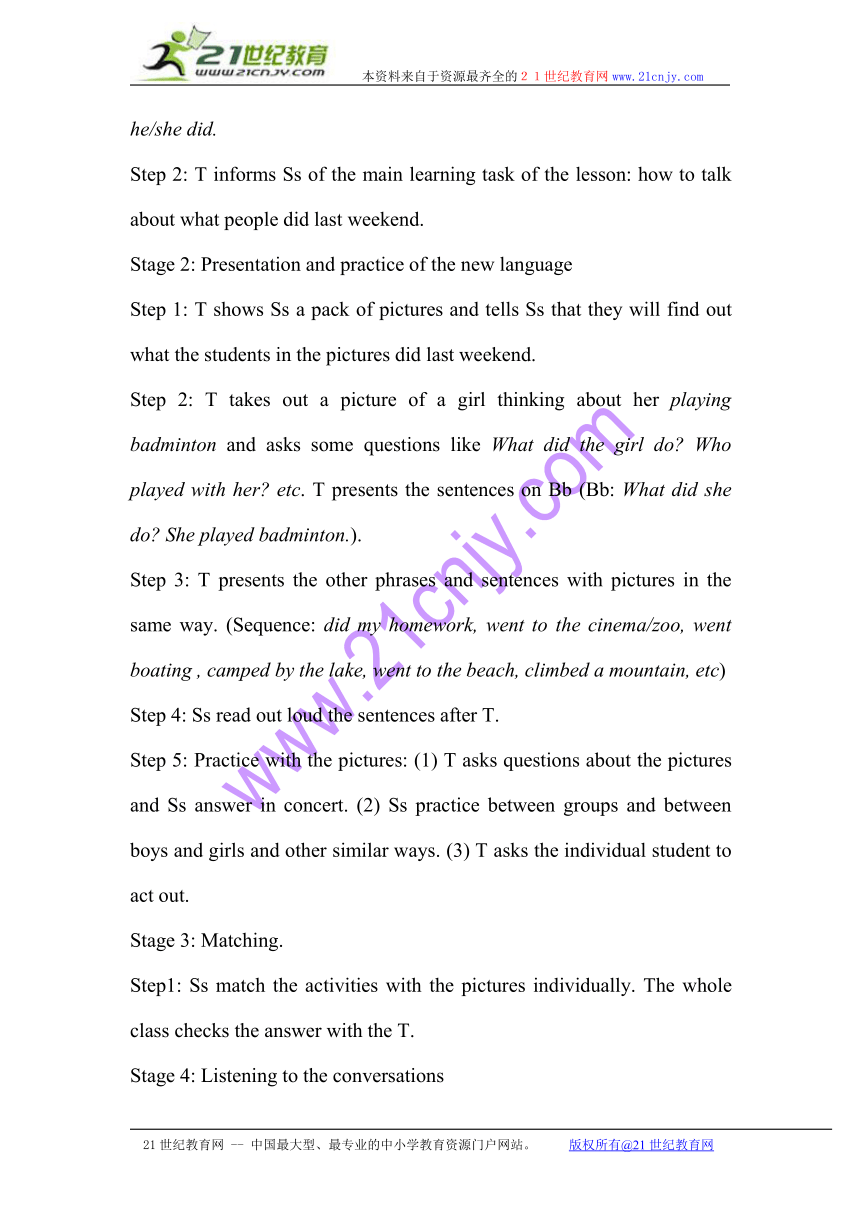Unit 12 What did you do last weekend?Section A(1a-2d)教学设计
文档属性
| 名称 | Unit 12 What did you do last weekend?Section A(1a-2d)教学设计 |  | |
| 格式 | zip | ||
| 文件大小 | 11.5KB | ||
| 资源类型 | 教案 | ||
| 版本资源 | 人教新目标(Go for it)版 | ||
| 科目 | 英语 | ||
| 更新时间 | 2013-06-03 23:22:40 | ||
图片预览


文档简介
Teaching Plan for Lesson 1,
Unit12 What did you do last weekend? J1B
Teaching Objectives
1. Learn and practice the verb phrases expressing what people did last weekend (e.g., did my homework, went to the cinema, went boating , camped by the lake, went to the beach, played badminton, etc.).
2. Learn and practice the sentence patterns: What did … do last weekend? I/Bob/Lucy/He/She/they played badminton / went to the cinema…. and use them to talk about the past events and describe what they did last weekend.
3. Listen to the conversations and fill in the blanks with “morning” “afternoon” or “night”.
4. Practice talking about what each student did last weekend in pairs.
5. Be aware that learning English is not just listening to the teacher about the words or grammar but also using the words & grammar rules to understand what people say or to express their ideas in real life.
Teaching Procedure
Stage1: Leading-in and introduction of the new unit
Step 1: T greets Ss and introduces the topic of the new unit by questions (asking them about the trips and what they did last weekend).
T: How was your trip last week? What did you do? Please guess what he/she did.
Step 2: T informs Ss of the main learning task of the lesson: how to talk about what people did last weekend.
Stage 2: Presentation and practice of the new language
Step 1: T shows Ss a pack of pictures and tells Ss that they will find out what the students in the pictures did last weekend.
Step 2: T takes out a picture of a girl thinking about her playing badminton and asks some questions like What did the girl do? Who played with her? etc. T presents the sentences on Bb (Bb: What did she do? She played badminton.).
Step 3: T presents the other phrases and sentences with pictures in the same way. (Sequence: did my homework, went to the cinema/zoo, went boating , camped by the lake, went to the beach, climbed a mountain, etc)
Step 4: Ss read out loud the sentences after T.
Step 5: Practice with the pictures: (1) T asks questions about the pictures and Ss answer in concert. (2) Ss practice between groups and between boys and girls and other similar ways. (3) T asks the individual student to act out.
Stage 3: Matching.
Step1: Ss match the activities with the pictures individually. The whole class checks the answer with the T.
Stage 4: Listening to the conversations
Step 1: T introduces the listening task to Ss: listen to the tape and fill in the blanks with “morning” “afternoon” or “night”.
Step2: Ss make clear of “morning” “afternoon” or “night” before listening.
Step 3: Ss listen and fill in the blanks with “morning” “afternoon” or “night” with what Lucy did last weekend.
Step 4: Ss listen again and checks answers.
Step 5: Ss read aloud the tape scripts after the tape. T corrects their pronunciation and intonation when necessary.
Step 6: Ss ask and answer about Lucy in 1a pictures in pairs.
Stage 5: Talking about our weekends
Step 1: Pair work: Ss ask and answer about what they did last weekend (T reminds Ss that they may use the conversations in 1b as reference.
Step 2: Volunteer pairs say out loud their dialogues in class and T asks other Ss about the dialogue and to check and revise their language.
What did the girl/you/… do?... Who played with her/his/you/ …?...
Stage 6: Summary and homework.
Step1: T guides Ss to summarize the verb phrases in three groups: did my homework, went to the cinema/zoo, went boating, camped by the lake, went to the beach, climbed a mountain, visited a museum. And T reminds Ss of the difference between past tense and present tense.
Step 2: Ss read aloud the new words, the phrases and the sentences together and do some translation practice.
Step 3: Homework: write down the dialogue they make in class and review Section A 2a-2d.
2013.04.10
Unit12 What did you do last weekend? J1B
Teaching Objectives
1. Learn and practice the verb phrases expressing what people did last weekend (e.g., did my homework, went to the cinema, went boating , camped by the lake, went to the beach, played badminton, etc.).
2. Learn and practice the sentence patterns: What did … do last weekend? I/Bob/Lucy/He/She/they played badminton / went to the cinema…. and use them to talk about the past events and describe what they did last weekend.
3. Listen to the conversations and fill in the blanks with “morning” “afternoon” or “night”.
4. Practice talking about what each student did last weekend in pairs.
5. Be aware that learning English is not just listening to the teacher about the words or grammar but also using the words & grammar rules to understand what people say or to express their ideas in real life.
Teaching Procedure
Stage1: Leading-in and introduction of the new unit
Step 1: T greets Ss and introduces the topic of the new unit by questions (asking them about the trips and what they did last weekend).
T: How was your trip last week? What did you do? Please guess what he/she did.
Step 2: T informs Ss of the main learning task of the lesson: how to talk about what people did last weekend.
Stage 2: Presentation and practice of the new language
Step 1: T shows Ss a pack of pictures and tells Ss that they will find out what the students in the pictures did last weekend.
Step 2: T takes out a picture of a girl thinking about her playing badminton and asks some questions like What did the girl do? Who played with her? etc. T presents the sentences on Bb (Bb: What did she do? She played badminton.).
Step 3: T presents the other phrases and sentences with pictures in the same way. (Sequence: did my homework, went to the cinema/zoo, went boating , camped by the lake, went to the beach, climbed a mountain, etc)
Step 4: Ss read out loud the sentences after T.
Step 5: Practice with the pictures: (1) T asks questions about the pictures and Ss answer in concert. (2) Ss practice between groups and between boys and girls and other similar ways. (3) T asks the individual student to act out.
Stage 3: Matching.
Step1: Ss match the activities with the pictures individually. The whole class checks the answer with the T.
Stage 4: Listening to the conversations
Step 1: T introduces the listening task to Ss: listen to the tape and fill in the blanks with “morning” “afternoon” or “night”.
Step2: Ss make clear of “morning” “afternoon” or “night” before listening.
Step 3: Ss listen and fill in the blanks with “morning” “afternoon” or “night” with what Lucy did last weekend.
Step 4: Ss listen again and checks answers.
Step 5: Ss read aloud the tape scripts after the tape. T corrects their pronunciation and intonation when necessary.
Step 6: Ss ask and answer about Lucy in 1a pictures in pairs.
Stage 5: Talking about our weekends
Step 1: Pair work: Ss ask and answer about what they did last weekend (T reminds Ss that they may use the conversations in 1b as reference.
Step 2: Volunteer pairs say out loud their dialogues in class and T asks other Ss about the dialogue and to check and revise their language.
What did the girl/you/… do?... Who played with her/his/you/ …?...
Stage 6: Summary and homework.
Step1: T guides Ss to summarize the verb phrases in three groups: did my homework, went to the cinema/zoo, went boating, camped by the lake, went to the beach, climbed a mountain, visited a museum. And T reminds Ss of the difference between past tense and present tense.
Step 2: Ss read aloud the new words, the phrases and the sentences together and do some translation practice.
Step 3: Homework: write down the dialogue they make in class and review Section A 2a-2d.
2013.04.10
同课章节目录
- Unit 1 Can you play the guitar?
- Section A
- Section B
- Unit 2 What time do you go to school?
- Section A
- Section B
- Unit 3 How do you get to school?
- Section A
- Section B
- Unit 4 Don't eat in class.
- Section A
- Section B
- Unit 5 Why do you like pandas?
- Section A
- Section B
- Unit 6 I'm watching TV.
- Section A
- Section B
- Review of Units 1-6
- Unit 7 It's raining!
- Section A
- Section B
- Unit 8 Is there a post office near here?
- Section A
- Section B
- Unit 9 What does he look like?
- Section A
- Section B
- Unit 10 I'd like some noodles.
- Section A
- Section B
- Unit 11 How was your school trip?
- Section A
- Section B
- Unit 12 What did you do last weekend?
- Section A
- Section B
